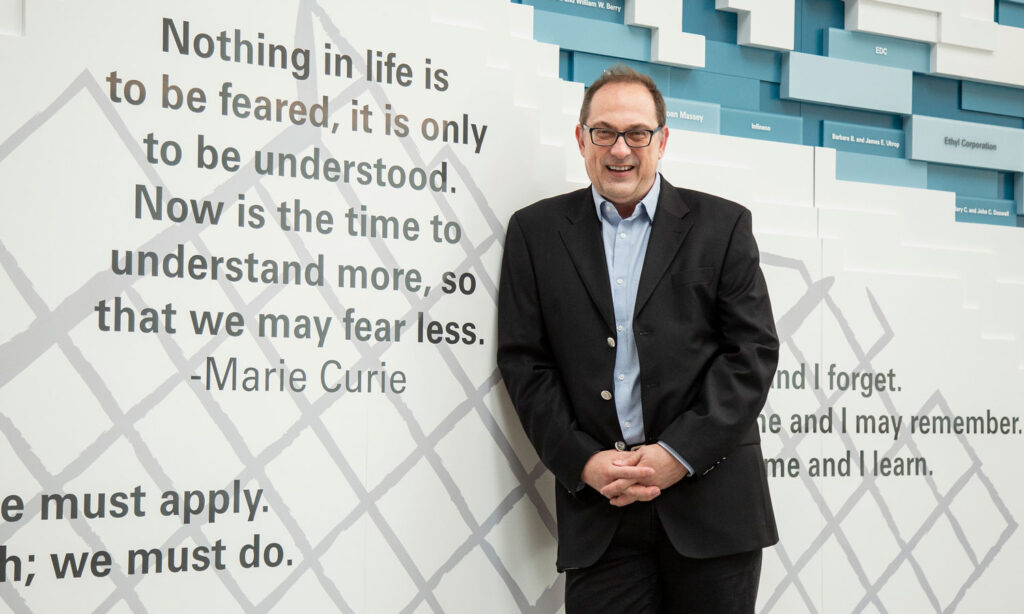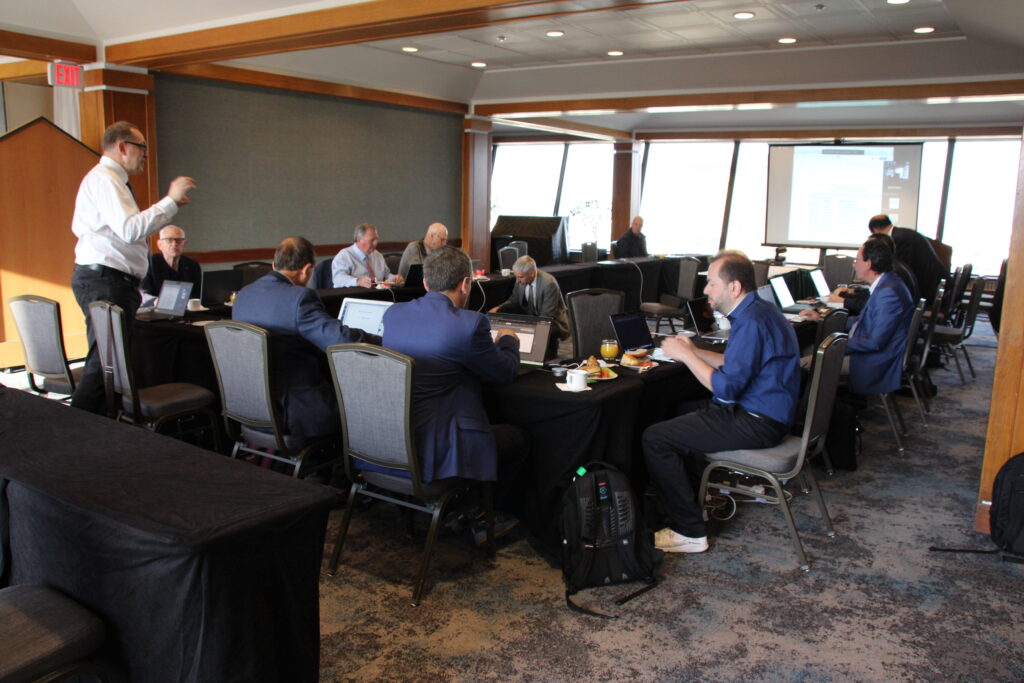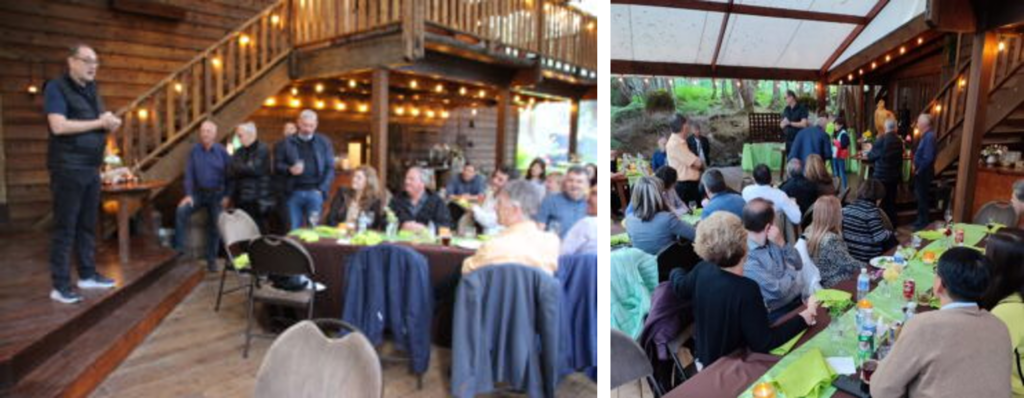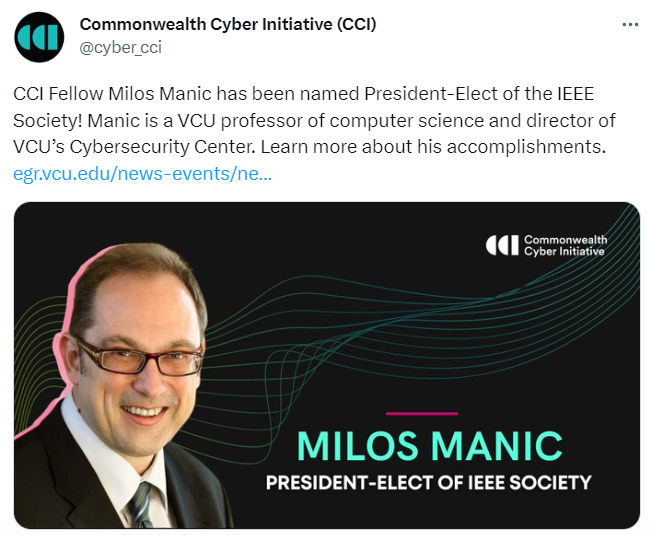Meet the President-Elect, Milos Manic
We had the chance to meet Prof. Milos Manic, a visionary who aims to turn our Society into a more proactive and responsible model. Milos told us about the two most important “head of the family” roles of his life, professionally as our IES President-Elect and personally as a father.

ITeN team: Dear professor, thanks a lot for being with us today, can you start by telling us about the highlights of your career?
That is a good question for anyone that is in senior stages of their career, because every highlight that you choose is the result of possibly many years of work on particular topic.
One of the main highlight is the Research and Development 100 Award for Autonomic Intelligent Cyber Sensor (AICS) that we were awarded in 2018. The invention was the result of first working in academic setting with national labs in cyber security and power grid, which resulted in several dissertations and earned several prior awards at the national level. The beauty of that achievement was that it has been selected for transition to practice by one of the top US agencies which is Department of Homeland, Security, science and technology (DHSS&T) and it has been commercialized by the Cynalytica under the name of OT OptICS as First Industrial AI-Driven Intrusion Detection System for Serial-Connected ICS.
It is interesting to see the process starting from just an idea to a final product commercially available. Many people get involved in the evolution of creating it, proofing it, demonstrating it in the industry, pushing it eventually to higher Technology Readiness Levels (TRL 1-9), where academia is mostly interested in TRLs 1 to 4. And I want to give credit to national lab partners, my students and Homeland Security and everybody involved in all these stages.
ITeN team: And of course another highlight would be the coming position of President of IES, can you tell more about your story as an IES volunteer?
I have been volunteering in IES for over 20 years. Back in year 2000, my professor, one of prominent figures of IES, gave me a task to help with one conference. There I met number of IES volunteers, some of whom are active officers today. Over the decades, my understanding of IEEE evolved, and I still have a lot to learn. I have always tried to do something that will make a difference once I leave that position.
In 2012 I was elected to Secretary position. Prior to that, we haven’t had much of electronic documents, or ways of digitally sharing AdCom documents. Today it may sound mundane, but I introduced electronic voting. Prior to that we created a new Joomla platform, which at that time was a revolutionary change because we only had static web pages. And more importantly we aligned ourselves with templates of IEEE. So suddenly we started looking on the internet as a unit of IEEE.
Then in 2019, I was elected to Treasurer position. Being a treasurer is very tough for engineers because there is a lot of accounting – we would have been in that field if we wanted to. Finance is a live matter and to be in better financial shape next year, either you reduce expenses, increase earnings, or try to do both, but you need to really understand where those are coming from. Therefore, I looked at the two most important makers of our surplus, which are publications and conferences, and tried to understand what is going to happen in next 10+ years. I am happy to I see that trend continuing with Aleksander Malinowski, who is an excellent treasurer. Next two years when I am President, I hope we will do this for all areas of our Society: membership, planning development, conferences, and others.

Once we understood our finance dynamics, we could open resources for innovative ideas. That is why I introduced calls for proposals. Like any National Science Foundation, we asked our volunteers what resources they need to be able to meet expectations in two directions:
One for improving and streamlining operations, which means how can we do our volunteers jobs faster, better, easier.
And the other one was how to continue and do better as our operations scale up. Our existing journals are adding pages, our issues are growing in numbers, we added new journals last couple of years. All of that takes even more volunteers’ time. And we do not have unlimited base of reviewers or associate editors that all have full time jobs.
Interestingly, when we opened the first call for proposals, we barely have any proposition. That money ended up not being used that year. But the in years to follow, we started receiving more and more. We realized that volunteers just needed to understand what the operations of a society mean. By looking at finances, we identified core issues for the future of society. In the US when you try to figure out what is going on, people say “just follow the money” … and that is probably true here!
ITeN team: And as the President-Elect of IES, what is your mission?
Exactly like I did as IES secretary and as Treasurer, I also try to introduce new practices as President-Elect. For example one of the roles of President-Elect in our society it to organize AdCom meetings. But I worked to introduce a first strategic workshop in the history of our IES society, which is now 72 years old.
This first “IES Vision 2030 Workshop” was held in Orlando in April this year in conjunction with the ICIT 2023, with the idea to get a roll-up view of our society, on how we do operations, how we think about Society 3, 5, 10 years ahead. Turning IES into a more proactive mode instead of a reactive mode is one of my biggest concerns. We as officers have a term and we need to switch our mindset from thinking “what I’m going to do within my term”, to “what our Society is going to do in next 3, 5,10 years for its publications, conferences, membership, etc.”.

ITeN team: Which advice would you give to boost our young reader’s career?
Because I am coming from Serbia, which is economically, socially, geopolitically quite different from the USA where I am living now, being actively involved in leadership position in IES was not even in my wildest dreams! But I ended up in position of IEEE Fellow and President-Elect. My career shows that somehow, it is possible for every young professional to reach a leadership position. I must give credit to people around me who were advising me at that time, and now comes my turn to give this advice:
Do not get boxed in what traditional norms say is the right path for you. Think about what the right research topic is and think about the way to solve a specific problem.
Do not necessarily be bound by the canonical examples of what has been going on in the past.
Think out of the box and try to solve problems.
In Artificial Intelligence world, for example, we need to think about a responsible use of AI. We are all aware that Geoff Hinton, one of the fathers of deep learning, recently left Google so he can speak more freely about this technology. As we humans invented AI, it has always been, and it remains our responsibility to make sure that AI is used a responsible way.
More generally, when it comes to us researchers and engineers, we should be fair and correct, not only in terms of mathematics but also in terms of serving humanity. Especially in IEEE where our motto is “Advancing Technology for Humanity”.
Trust, ethics, morality, bias, fairness should be integral part of any engineering solutions, because they impact not only humans but every living, animals, plants, being on the planet.

ITeN team: Now we will talk about something more personal. Whenever you manage to get some free time, what are your hobbies?
I used to love skiing and ski patrolling, and I used to play in bands, guitar and piano. But I have less and less time.
Now I love spending time with my 11- and 13-year-old kids, they grow up so fast! Being a father and a husband is probably the most important role in my life. And I truly try to spend every living moment with them, we play games, do sports, we do so many different things.
What I am really interested in is how they perceive what they can do, and then I compare with what I was thinking at that time and what my interest were. And it is interesting how today we combine the technology into new experience and new education. I love working on math problems with them and sometimes I am confused how they are taught in new ways. But interestingly, most often we go back to traditional ways, for example to solve a polynomial. Luckily, we can still survive with modern technology based on what fundamental things we have learned!
I also enjoy working around the house. Now that my kids are a bit older, I try to teach them how to repair and be self-sufficient. It all goes back to basic math and physics. In the evenings we congratulate each other on successful day and things we have done together. Another thing that we like doing are weekend “popcorn movie nights”. We just relax and laugh.
Spending time together is important, and I try to bring family to IES events. My elder daughter was less than six months old when we took her to ISIE in Bari, Italy in 2010.
Within IES, we all really perceive our society as one big family, as our volunteers mentioned it many times in the IES Vision 2030 Workshop in Orlando. We know each other well, personally, not just professionally, and we know each others’ families. And that is a great differentiator between us and other societies, more business-oriented. That advantage may not cater to the fastest growth or most financial gain, but most of our members perceive this as most valuable glue that keeps us together in good times and in bad times. We help and support each other, which is a wonderful thing, that is a great attractor. Therefore. I encourage young people to get involved in our Society and forge personal connections. I hope we continue to make big strides and be a role model for others in that sense.

